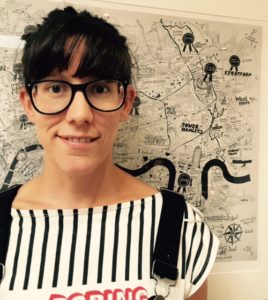In my dream I ask tentatively for feedback to allow me to make the necessary changes to the proposal so I can resubmit next time. In my dream they advise me not to submit again next year. They tell me they do not award fellowships or funding to speech and language therapists and that my idea wasn’t great anyway and really do not ever apply again.
I know anxiety dreams are not uncommon, but they are uncommon for me. I believe that mine is probably related to my keen desire to continue my career as a researcher in the field of dementia and applying for the small number of funders that I am eligible for. Many organisations that provide research funding in the field of dementia are far more focused on causes and cures, rather than care and quality of life. And many of the smaller pots of money that are available for care do not provide a salary.
My concerns are also related to the lack of stability in my working life. I am currently employed on a short-term contract, until the end of October- as part of the NIHR Development Skills Enhancement Award [1] that I hold. I am also employed on a short-term contract within the NHS, working within a dementia service. This position is supported by charitable funding and NHS commissioning is certainly not guaranteed given the current COVID-19 pandemic. Should I not get further research funding I might have to do more work within the NHS, should my NHS funding not continue I may need to look elsewhere completely.
I know this sob story is not a new one, but gosh darn, it is terribly frustrating.

Grant writing is many things — difficult, challenging, confusing, frustrating, mind-boggling and competitive. The added pressure of needing funding to stay employed adds to the pressure.
A colleague recently commented that I sounded less confident than I had done in a while. I think this is possibly also related to an experience I had when putting together a recently fellowship application. I sought advice and guidance from many many people during this process, but unfortunately it is always the negative stuff that sticks with you. The constructive criticism is ace. What I am talking about is the completely undermining stuff. I was advised that I should not apply, that my project proposal was not at all good enough and that I was not qualified enough. This came after having received positive feedback from a number of professors (neurologists, speech and language therapists and psychologists) and leaders in this field of research who championed me to apply. These lovely people had already signed up as mentors and supervisors. Yet, this one single (not professor) really affected me.
Fortunately, I was generally galvanised by this person. I drove me to do better. It drove me to spend more time working on and being determined to get some funding. I have yet to hear the outcome of the fellowship I did submit. However, I have been reflecting on the journey and I think my current top tips for surviving the unstable and insecure life of an ECR (Early Career Researcher) are as follows:
- Surround yourself with the right people, seek support and advice from people you trust and respect.
- Make sure you find peers who are supportive too, it is great to have a support group, a kind of cheering committee who can help one another and talk about these things.
- If one person brings you down, go back to those others, who have championed you and tell them about it. Ask and check with them. Don’t be alone with things that undermine your confidence. This can often make it worse.
- Be kind to yourself. Just because you have done your PhD doesn’t mean you’ve got this. Allow yourself not to know things and ask for help and advice.
- Don’t put all your eggs in one basket. Apply for lots of different fellowships, different size grants and jobs. Applying for only one thing may feel like you can hone an application to perfection but can also put you more at risk.
- Make sure to keep doing other stuff like writing articles, research and lecturing where possible. Not only is this fun, will maintain your outputs and remind that you are good at this, but this also means you are becoming indispensable to other people, building networks and creating opportunities.
- Remind yourself why you are doing this, reflect on your successes. Attend a conference, or present at a conference. Enjoy being an ECR – you have finished your PhD and you don’t yet have the huge responsibility of managing heaps of other people below you.
- Do things in your personal life, make sure you don’t deprioritise things that make you happy.
- Have back up plans, that are tolerable. At least you have a safety net there.
Author [2]
[2]
Dr Anna Volkmer [3] is a Speech and Language Therapist and researcher in Language and Cognition, Department of Psychology and Language Sciences, University College London. Anna is researching Speech and language therapy interventions in language led dementia and was once voted scariest speech and language therapist (even her children agree).